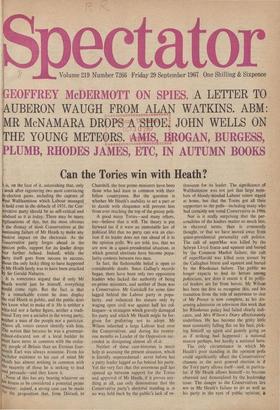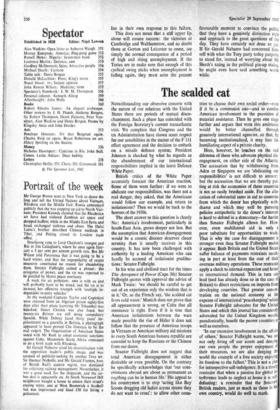t is, on the face of it, astonishing that, only
week after registering two most convincing y-election gains, including the capture of est Walthamstow which Labour managed hold even in the debacle of 1931, the Con- ative party should be as self-critical and bdued as it is today. There may be many Planations of this, but the most obvious the dismay of 'itioSt Conservatives at the ntinuing failure of Mr Heath to make any ositive impact on the electorate. As the riservative party forges ahead in the pinion polls, support for its leader drops Ver farther behind. Indeed, while the rty itself goes from success to success, bout the only lucky thing to have happened Mr Heath lately was to have been attacked y Sir Gerald Nabarro.
It is sometimes argued that if only Mr eath would just be himself, everything ,ould come right. But the fact is that 9 a remarkable extent he does display e real Heath in public, and the public does ot know what to make of it. He is neither a hiz-kid nor a father figure, neither a tradi- tonal Tory nor a socialist in the wrong party, either a man of the people nor a patrician. Above all, voters cannot identify with him. he notion that because be was a grammar- 'Phool-educated son of a local builder he dust have more in common with the ordin- ary people of Britain than an Etonian four- teenth Earl was always nonsense. From his bachelor existence to his cast of mind Mr heath has almost nothing in common with the majority of those he is seeking to lead 41Id persuade—and they know it. None of this has any bearing whatever on hIS fitness to be considered a potential prime ?Ili-lister: indeed, a strong case can be made r the proposition that, from Disraeli to Churchill, the best prime ministers have been those who had least in common with their fellow countrymen. But the question is whether Mr Heath's inability to act a part or to dazzle with eloquence will prevent him from ever reaching the top of the greasy pole.
A good many Tories—and many others, too—believe that it will. The theory is put forward (as if it were an immutable law of political life) that no party can win an elec- tion if its leader does not run ahead of it in the opinion polls. We are told, too, that we are now in a quasi-presidential situation, in which general elections have become popu-. larity contests between two men.
In fact, the fashionable belief is open to considerable doubt. Since Gallup's records began, there have been only two opposition leaders who lacked the authority of being ex-prime ministers, and neither of them was a Conservative. Mr Gaitskell for some time lagged behind the Labour party in popu- larity, and enhanced his stature only by waging open civil war against half his col- leagues—a stratagem which gravely damaged his party and which Mr Heath might be for- given for preferring not to adopt. Mr Wilson inherited a large Labour lead over the Conservatives, and during his twenty- one months as Leader of the Opposition suc- ceeded in dissipating almost all of .it.
Neither of these case-histories is much help in assessing the present situation, which is literally unprecedented : never before has a party leader lagged so far behind his party. Yet the very fact that this enormous gulf has opened up between support for the Tories and approval of Mr Heath, if it proves any- thing at all, can only demonstrate that the Conservative party's electoral standing is in no way held back by the public's lack of en- lies in their own response to this failure.
This does not mean that a stiff upper lip alone will ensure success: the victories at Cambridge and Walthamstow, and no doubt those at Gorton and Leicester to come, are simply the normal consequence of a period of high and rising unemployment. If the Tories are to make sure that enough of this cyclical swing sticks when unemployment is falling again, they must seize the present favourable moment to convince the public that they have a genuinely distinctive style and approach to the great questions of the day. They have certainly not done so yet, If Sir Gerald Nabarro had concerned him. self with what the Tory party today purports to stand for, instead of worrying. about Mr Heath's rating in the political pin-up stakes, he might even have said something worth while.







































